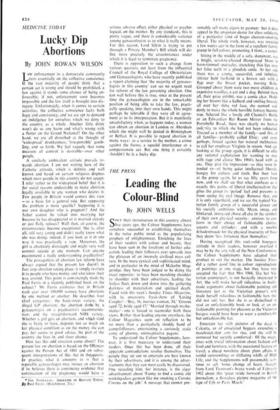THE PRESS
Leading the Colour-Blind
By JOHN WELLS
C INCE their introduction in this country almost afive years ago, the Colour SUpplements have somehow succeeded in establishing themselves in the naïve public mind as the popularising prophets of enlightenment. Enriching the lives of their readers with colour and beauty, they have been seen in the forefront of further edu- cation, leading their followers ever upwards into the plateaux of an intensely civilised mass cul- ture. In the more cynical and sophisticated mind, and in particular in the mind of Malcolm Mug- geridge, they have been judged to be doing the exact opposite: to have been marching shoulder to shoulder with their advertisers, leading the listless flock down and down into the gathering darkness of materialism and spiritual death. Faced with this week's Sunday Thnes Magazine, with its unsavoury freak-show of 'Loving Couples'— `Boy, 16, marries woman, 34,"Groom aged 72, bride aged 17,"Married through mathe- matics'—one is forced to reconsider both these views. Rather than leading anyone anywhere, the Colour Magazines seem on reflection to be no more than a particularly shoddy band of camp-followers, entertaining a curiously static army of gloomy, unimaginative pagans.
To understand the Colour Supplements, how- ever, it is first necessary to understand their readers. Once this has been done, all their apparent contradictions resolve themselves. The people they set out to entertain are best known by their advertisers, and it is among the adver- tisements that they can most easily be discovered. One revealing hint, for instance, is the cigar advertisement about 'Funny to find a comic old working-class gasman like me smoking a Corona Corona on the job.' A message that cannot pre-
sumably sell many cigars to gasmen: but it does appeal to the unspoken desire for class solidarity of a particular kind of bogus cheroot-smoking
liberal. The whole truth, however, was revealed a few weeks ago in the form of a repellent family grotto in full colour, promoting, I think, a carpet. Sitting in the middle of a sofa, dominant, was a bright, scrawny-chested Hampstead Mum in horn-rimmed spectacles, stretching thin lips over her false teeth in a ghoulish smile. At her side there was a young, successful, and infinitely sinister bald husband in a brown suit with a flap over the breast pocket, nursing Baby. Grouped about them were two more children in expensive woollies, a cat and a dog. Behind them all, their prize exhibit, was a comic char. 1-fold. ing her broom like a halberd and smiling bravely
all over her shiny red face, she seemed sud- denly to make the whole horrible fantasy become true. Selected like a lovely old Chemist's Bottle or an Edwardian Bar Room Mirror from the Portobello Road, there was clearly no human indiinity to which she had not been subjected. Treated as a member of the family—and this. of all families—probably called Elsie: and even, perhaps, forced against her natural inclinations to 'call her employer Virginia in return. And yet, looking at the group again, it is difficult to offer any rational explanation for wanting to roar with rage and cleave Mrs 1966's head with an axe. They give the impression—as they were in- tended to—of being quiet intellectual liberals, hungry for culture and truth. But then look at the group again, let us say fifty years from now, and we shall see that what confuses us is exactly this patina of liberal intellectualism that gives the group its 'period' feel and prevents us from seeing the real image. Remove that, and it is only superficial, and we see the typical Vic- torian family group of a successful grocer and his socially ambitious wife. Mean, smug, and blinkered, interested above all else in the symbols of their own physical security : anxious to con- form in their choice of fashionable clothes, accents and attitudes: and with a morbid Schadenfreude for the physical insecurity of those they deem 'less fortunate than themselves.'
Having recognised this rock-solid bourgeois attitude in their readers, however overlaid it may be by the arty talk of the New Conformism, the Colour Supplements have adapted their product to suit the market. The Sunday Times did a rather good line in colour reproductions of paintings at one stage, but they have now accepted the fact that Mrs 1966, like her Vic- torian counterpart, is not basically interested in Att. She will make herself ridiculous in badly- made arguments about fashionable painting and literature just as the Victorian grocer's wife made herself ridiculous in fashionable hats that did not suit her. But she is as disinclined to read an unfashionable book or look at an un- fashionable painting for pleasure as the Victorian burgess would have been to wear a comfortable but unfashionable hat.
Entertain her with pictures of the dead in Calcutta, or of emaciated beggars extending a matchstick-thin arm for rice, and she will he unmoved but secretly comforted : fill the maga- zines with trivial information about fashion and food and furniture, with the occasional feature on travel, a cheap novelette about glum affairs in sordid surroundings or titillating whiffs of High Life, and the Supplements will presumably con- tinue to sell. Some change of heart, though. from Lord Thomson's brave words of February 1962 about this 'great stride forward in British journalism, a first-class picture magazine of the type of Life or Paris Match.'


































 Previous page
Previous page